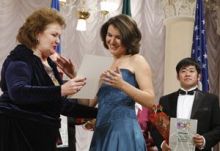For ten days, Kyiv was invaded by music. Qualifying rounds of the Fourth Mykola Lysenko International Music Contest were held at four main concert hall of the Ukrainian capital. This contest became a final chord of the number of festivities dedicated to the anniversary of Mykola Lysenko, an outstanding musician and public figure, founder of the Ukrainian professional composer school, promoter of the national art education (1842-1912). This year’s forum focused on the point of intersection of four anniversaries: Lysenko’s 170th birthday, the centennial of his death, the 50th anniversary of the contest’s start, and the 15th of its international status.
The high-profile music tournament was divided into four categories: violin, cello, piano, and solo singing. It gathered an unprecedented number of participants: 162 performers from 16 countries submitted their applications for this prestigious forum. Reputable musicians, representatives of the world performance elite from various countries made up the jury of the contest, which also included laureates of previous Lysenko contests. The atmosphere of extraordinary emotional agitation among the contestants themselves, as well as among their teachers, family members, and colleagues, spread far beyond the concert halls.
The masterminds of the contest introduced four innovations this year: an impressive money prize fund (20, 14, and 8 thousand dollars for the first three winners, respectively), the new declared principle of the jury’s voting, aimed at dissipating the public’s doubts about the possible corruptibility and subjective bias of the judges, intensified guarantees of the objectiveness of judgment, ensured by the presence of international observers, and promises to provide the winners with concert engagements. These novelties drew a lot of attention to this year’s forum from everyone involved in academic music.
The curiosity of both professionals and music lovers instantly skyrocketed when they learned that the famous violin expert, owner of the dealer network, Florian Leonhard would bring a unique violin, crafted in 1727 in Cremona by the famous luthier Giuseppe Guarneri del Gesu. Indeed, Kyiv’s public had an opportunity to hear this legendary instrument at the opening (played by the laureate of the First Mykola Lysenko International Contest Dmytro Tkachenko), and this year’s second prize winner, Russian violinist Poman Filipov, played it at the final gala concert.
Traditionally, Lysenko’s granddaughter, professor at the Pyotr Tchaikovsky National Music Academy of Ukraine, Rada Lysenko was the honorable guest of the contest. She shared her impressions with The Day:
“I am deeply fond of this contest that is named after my celebrated grandfather. I think that the contest was held on a rather high level. I want to note the professional and stable work of the piano jury, headed by professor of the National Music Academy Valerii Kozlov. We are all witnessing the gradual increase in the prestige of our contest not only in Ukraine, but on the international scene as well. You know, one of my students, Sin Sin Ma, a talented musician from China, also participated in the contest, though she did not become a prize winner. However, I think that all her main victories are ahead!”
Olha Kulchynska, the National Music Academy student (Maria Stefiuk’s class), and Ihor Yevdokymenko, soloist of the National Opera of Ukraine, became the first prize winners among 78 singers. Oleksii Shadrin (Ukraine) received the first prize in the “cello” nomination. He also was awarded the special prize “For the Best Performance of a Piece by Mykola Lysenko.” The Russian violinist Roman Filipov won the second prize in the “violin” nomination. This time, the first prize was not awarded at all in this nomination. The same situation occurred among the pianists, and Rustam Muradov (Russia) was awarded the second prize.
COMMENTARIES
“THE MAIN THING IS TO KEEP THE PRESENT OUTBURST OF THE PUBLIC’S INTEREST IN THIS WONDERFUL FORUM ALIGHT”
Taras FILENKO (USA):
“This contest showed the general increase of the participants’ mastery, gradual winning of international recognition, mainly on the level of acquiring an international and truly ‘celebrity’ jury. However, the contest has not been properly publicized in the world, and in my opinion, in order to achieve it, some serious and intense work of the organization committee is necessary during the entire forced four-year vacation. I think that the contest should be held every two years at the most, with one category distinguished each year: for example, the piano should be featured this year, the violin – the next, and so on. The performing age of contestants is short, especially for vocalists, who mature as musicians quite late in life, after 25 years (and for bass singers it takes even longer), and young people barely manage to enter the contest twice before they are way too old. I see the perspective in the international recognition of this contest, via systematic involvement of Ukrainian embassies in various countries, and via establishing private contacts with world-known managers in this field.”
“THE CONTEST AS A TICKET TO THE BIG CONCERT FUTURE”
Ivan KUCHER (Ukraine):
“An exceptionally favorable climate of mutual understanding, tolerance, and high professionalism dominated our ‘local’ jury. After the contest was over, I personally thanked each jury member. I hope each contestant, laureate, and judge will preserve a part of this warm and friendly atmosphere of our contest, which displayed a high level of both performance skills and organization. Everyone was impressed by the brilliant performance of our countryman, the 19-year-old first prize winner Oleksii Shadrin. His future looks promising even at this stage. His performance demonstrates complete harmony of technical excellence, extremely vivid musicality, and beautiful sound. I think this contest will open a way into a great concert future for him.”








